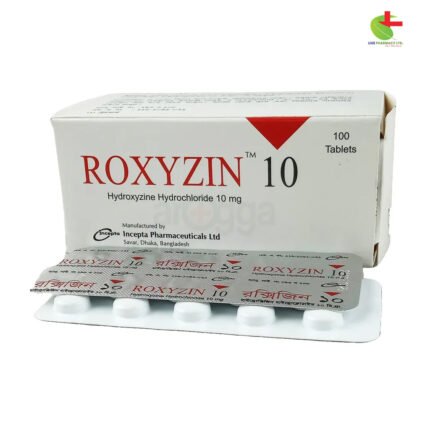Roxyzin 25
20.00৳ Strip
- Roxyzin Hydrochloride is a sedating antihistamine indicated for anxiety relief and management of allergic pruritus.
- Effective as a sedative for premedication or post-anesthesia.
- Targets specific areas of the central nervous system, providing rapid relief within 15 to 30 minutes.
- Long-term safety requires periodic evaluation by a healthcare professional.
- Always use Roxyzin as directed by a registered physician.
 Brand
Brand
|
Incepta Pharmaceuticals Ltd |
|---|---|
 Generics
Generics
|
Hydroxyzine Hydrochloride |
 Type
Type
|
Tablet |
Indications
Roxyzin Hydrochloride is recommended for:
- Anxiety Relief: Provides symptomatic relief from anxiety and tension linked to psychoneurosis, and serves as a supplementary treatment in conditions where anxiety is present.
- Management of Pruritus: Effective for alleviating itching caused by allergic conditions such as chronic urticaria, atopic and contact dermatitis, as well as histamine-induced itching.
- Sedation: Functions as a sedative when used for premedication or after general anesthesia.
The long-term effectiveness of Roxyzin as an antianxiety medication (beyond 4 months) has not been evaluated through systematic clinical studies. Physicians should periodically review the appropriateness of the medication for each patient.
Always use medication as directed by a registered healthcare professional.
Pharmacology
Hydroxyzine Hydrochloride belongs to the piperazine class of anxiolytic antihistamines, acting primarily as an H1 receptor antagonist. Unlike cortical depressants, Hydroxyzine may reduce activity in critical areas of the central nervous system’s subcortex. It has demonstrated primary skeletal muscle relaxation and has been shown to possess bronchodilator, antihistaminic, and analgesic properties both experimentally and clinically. It also exhibits antiemetic effects, as confirmed by both the apomorphine and veriloid tests. Hydroxyzine is rapidly absorbed via the gastrointestinal tract, with clinical effects typically observed within 15 to 30 minutes of oral intake.
Dosage & Administration
For Symptomatic Relief of Anxiety and Tension:
- Adults: 50-100 mg, taken 4 times daily.
- Children (6 years and older): 50-100 mg (5-10 teaspoonfuls), divided throughout the day.
- Children (under 6 years): 50 mg (5 teaspoonfuls), divided throughout the day.
For Pruritus Due to Allergic Conditions:
- Adults: 25 mg, taken 3 to 4 times daily.
- Children (6 years and older): 50-100 mg (5-10 teaspoonfuls), divided throughout the day.
- Children (under 6 years): 50 mg (5 teaspoonfuls), divided throughout the day.
As a Sedative (Premedication and Post-Anesthesia):
- Adults: 50-100 mg.
- Children: 0.6 mg/kg of body weight.
Always use medication as directed by a registered healthcare professional.
Interactions
Roxyzin may enhance the effects of Meperidine and barbiturates; thus, adjustments to dosages should be tailored individually in pre-anesthetic contexts. It does not interfere with atropine or other belladonna alkaloids and can be safely used alongside digitalis. However, concurrent use with monoamine oxidase inhibitors is not recommended.
Contraindications
Hydroxyzine is contraindicated for individuals with known hypersensitivity to Hydroxyzine or any of its components.
Side Effects
Common side effects associated with Roxyzin Hydrochloride are generally mild and transient. These may include drowsiness, headaches, psychomotor impairment, and antimuscarinic effects such as urinary retention, dry mouth, blurred vision, and gastrointestinal disturbances. Rare side effects can include hypotension, palpitations, arrhythmias, extrapyramidal symptoms, dizziness, confusion, depression, sleep disturbances, tremors, seizures, hypersensitivity reactions (including bronchospasm, angioedema, and anaphylaxis), rashes, blood disorders, liver dysfunction, and angle-closure glaucoma.
Pregnancy & Lactation
Current clinical data are insufficient to confirm the safety of Hydroxyzine during early pregnancy. Consequently, it is contraindicated during this period. The excretion of Hydroxyzine in human breast milk is not well established, so it should not be administered to nursing mothers.
Precautions & Warnings
Consider the potentiating effects of Roxyzin when combining it with central nervous system depressants, including narcotics, non-narcotic analgesics, and barbiturates. Dosage adjustments may be necessary. Patients should be warned of potential drowsiness and advised against driving or operating heavy machinery. The combined use of other CNS depressants and alcohol should also be avoided.
Use in Special Populations
Renal Impairment: Dosage should be halved for patients with renal impairment.
Elderly Patients: Initiate treatment at half the standard dose due to prolonged effects.
Overdose Effects
The primary symptom of Roxyzin overdose is hypersedation. When managing an overdose, consider that multiple substances may have been ingested. If vomiting has not occurred, it should be induced, and gastric lavage may be necessary. Continuous monitoring of vital signs and supportive care is essential. Although hypotension is rare, it can be managed with intravenous fluids and agents like Levarterenol or Metaraminol. Epinephrine should not be administered, as it may counteract the pressor effects of Roxyzin.
There is no specific antidote for Roxyzin, and hemodialysis is unlikely to be effective unless other drugs, such as barbiturates, are also involved.
Therapeutic Class
Sedating Antihistamine
Storage Conditions
Store in a cool, dry place, away from light. Keep out of reach of children.













Reviews
There are no reviews yet.